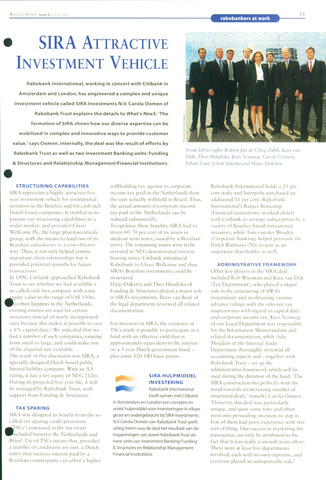SIRA Attractive
Investment Vehicle
0*
WHAT'S NewS Issue 6 June 1997
rabobankers at work
Rabobank International, working in concert with Citibank in
Amsterdam and London, has engineered a complex and unique
investment vehicle called SIRA Investments N.V. Carola Oomen of
Rabobank Trust explains the details to What's NewS. 'The
formation of SIRA shows how our diverse expertise can be
mobilized in complex and innovative ways to provide customer
value,' says Oomen. Internally, the deal was the result of efforts by
Rabobank Trust as well as two Investment Banking units: Funding
Structures and Relationship Management Financial Institutions.
From left to right: Robert jan de Clerq Zitbli, Kees van
Dijk, Theo Hendriks, Kees Versteeg, Carole Oomen,
johan Lont, Johan Jansma and Haijo Dijkstra.
STRUCTURING CAPABILITIES
SIRA represents a highly attractive five-
year investment vehicle for institutional
investors in the Benelux and for cash-rich
Dutch-hased contpanies. It enahled us to
present our structuring capabilities to a
wider market, and provided Glaxo
Wellcome Plc, the large pharmaceuticals
group, with the means to fund one of its
Brazilian subsidiaries in a cost-effective
way. Thus, it not only helped cement
important cliënt relationships hut it
provided potential spinoffs for future
transactions.
In 1996, Citibank approached Rabobank
Trust to see whether we had available a
so-called cash-box company with a net
jjauity value in the range of US$ 150m.
often happens in the Netherlands,
existing entities are used for certain
structures instead of newly incorporated
ones because this makes it possible to save
a 1% capital duty.) We indicated that we
had a number of such companies, ranging
from small to large, and could make one
of the required size available.
The result of this discussion was SIRA, a
specially-designed Dutch-based public
limited liability company. With an AA
rating, it has a net equity of NLG 212m.
During its projected five-year life, it will
be managed by Rabobank Trust, with
support from Funding Structures.
TAX SPARING
SIRA was designed to benefit from the so-
called tax sparing credit provisions
^LTSCs') contained in the tax treaty
BRncluded between the Netherlands and
Brazil. Use of TSCs means that, provided
a number of conditions are met, a Dutch
entity that receives interest paid by a
Brazilian counterparty can offset a higher
withholding tax against its corporate
income tax paid in the Netherlands than
the sum actually withheld in Brazil. Thus,
the actual amount of corporate income
tax paid in the Netherlands can be
reduced substantially.
To optimize these benefits, SIRA had to
invest 60-70 per cent of its assets in
medium term notes, issucd by a Brazilian
entity. The remaining assets were to be
invested in NLG-denominated interest
bearing notes. Citibank introduced
Rabobank to Glaxo Wellcome and thus
SIRA's Brazilian investments could be
structured.
Haijo Dijkstra and Theo Hendriks of
Funding Structures played a major role
in SIRA's investments. Boris van Beek of
the legal department reviewed all related
documentation.
For investors in SIRA, the existence of
TSCs made it possible to participate in a
fund with an effective yield that is
approximately equivalent to the interest
on a 5-year Dutch government bond -
plus some 120-140 basis points.
SIRA HULPMIDDEL
INVESTERING
Rabobank International
heeft samen met Citibank
in Amsterdam en London een complex en
uniek hulpmiddel voor investeringen in elkaar
gezet en ondergebracht bij SIRA Investments
N.V.Carola Oomen van RabobankTrust geeft
uitleg. Intern was de deal het resultaat van de
inspanningen van zowel RabobankTrust als
twee units van Investment Banking: Funding
Structures en Relationship Management
Financial Institutions.
Rabobank International holds a 25 per
cent stake and Interpolis purchased an
additional 11 per cent. Rabobank
International's Rutger Brascamp
(Financial institutions) worked closely
with Citibank to arrange subscription by a
variety of Benelux-based institutional
investors, while Tom van der Weijden
(Corporate Banking) helped persuade the
Dutch Railways (NS) to join as an
important shareholder as well.
ADMINISTRATIVE FRAMEWORK
Other key players in the SIRA deal
included Rob Wiesman and Kees van Dijk
(Tax Department), who played a major
role in the structuring of SIRA's
investments and in obtaining various
advance rulings with the relevant tax
inspectorates with regard to capital duty
and corporate income tax. Kees Versteeg
of our Legal Department was responsible
for the Information Memorandum and
related documentation, while Adri
Meijdam of the Internal Audit
Department thoroughly reviewed all
accounting aspects and - together with
Rabobank Trust - set up the
administrative framework which will be
used during the duration of the fund. 'The
SIRA construction fits perfectly with the
trend towards an increasing number of
structured deals,' remarks Carola Oomen.
'However, this deal was particularly
unique, and quite some time and effort
went into persuading investors to step in.
Few of them had prior experience with this
sort of thing. Our success in marketing the
transaction can only be attributed to the
fact that it was really a smooth team effort.
There were at least five departments
involved, each with its own expertise, and
everyone played an indispensable role.'

